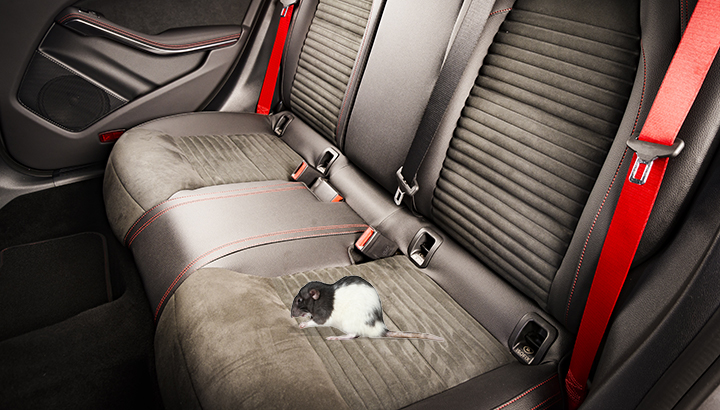Dealing with a rodent infestation is never a pleasant affair. Having the sanctity of your home violated by fuzzy little invaders is not only an inconvenience, but a serious health and safety risk to you and your family. But did you know there’s another area of your life that might be susceptible to rogue rodents and their insidious infiltration? Believe it or not, you might just have a rolling infestation on your hands, because mice love to infest cars, so you may find mice in your car.
The Risks of Rolling with Rodents
Having mice or other rodents infest your car is a serious problem for several reasons. The Center for Disease Control notes that, not only do mice present a health risk as carriers of the hantavirus and other diseases, but their nesting materials can affect air quality and aggravate breathing conditions such as emphysema, asthma, and Chronic Obstructive Pulmonary Obstructive Disease (COPD). They can also cause damage to your vehicle’s electrical system (mice love to chew wires), making it actually dangerous to drive by putting key system components at risk of failure.
Signs Mice Have Made a Home in your Car
Like many other rodents, mice are opportunists, and will invade your car through any available point of entry. Vehicles that are left unused for long stretches of time are particularly susceptible, as are those parked in high grass or near a field. But any vehicle can become a home to rodents, and they’ll make a home just about anywhere, including (but certainly not limited to):
- Ductwork and air filters
- The trunk/spare tire compartment/toolboxes and compartments
- Headlight and taillight areas
- The passenger areas of the vehicle, including the seats, glove box, and headliner
- The engine compartment and insulation
Droppings, nesting materials (shredded fibers, papers, etc.) and, of course, mice themselves are all signs your vehicle may have unwelcome guests hitching a ride.
Keeping Mice Outside Your Ride
You can minimize your risk of rodents by keeping food to a minimum in your vehicle. Parking on gravel or pavement, far from areas mice love (such as fields, wood piles, dumpsters, etc.) can help, too. But since mice are so tenacious and widespread, regular inspection is your best defense.
No matter what kind of vehicle you drive, make sure you regularly inspect it for signs of infestation. A weekly tidy of your car’s interior pairs nicely with a quick review of your trunk, engine compartment, and undercarriage to check for signs of mice. Any unusual smells, sights, or sounds should be investigated immediately. If you do see signs of infestation, a professional cleaning and extermination is likely in order; the pros will not only ensure your car is rodent-free afterward, but help you identify potential vectors of reinfestation to keep it from happening again.
Don’t forget to also check your vehicle’s electrical system if you see signs of infestation. Battery cables and crucial wires may be damaged, and your car may not be safe to operate. If you think rodents have compromised your vehicle, you may want to call in a mechanic as well, just to be safe.
Whether you think your auto might be home to furry freeloaders, or you’re simply looking to keep them out, calling a professional is the best way to go. Get in touch with your friends at American Rat Control, and our team of pest control experts will work with you to remove rodents from your ride—and help keep them from tagging along in the future.








